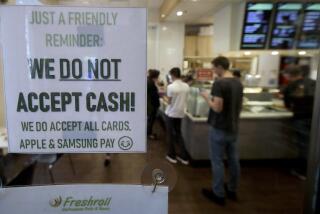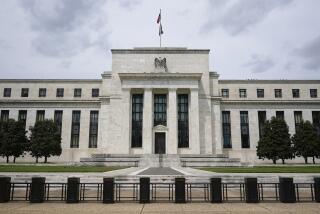The Cutting Edge: COMPUTING / TECHNOLOGY / INNOVATION : Cashless Society Gets Closer With Plans for Electronic Currency : Money: A plethora of companies are devising digital means to supplant the greenback.
- Share via
Tim Jones is on a global mission. He wants the world to put aside its coin and paper money and adopt a new form of currency--the electronic kind.
Jones, chief executive of Mondex, a British company that is promoting its own system of electronic money, envisions a world where people use common appliances like phones and televisions to transfer money from their bank accounts into electronic cards that can then be used like cash for bus fares, newspapers and even Internet purchases.
“You could give your child pocket money on the card in yen that he could use on the Internet to buy the latest Nintendo game from Japan,” says Jones, who five years ago invented a system that he hopes will soon be used around the world in every currency.
Mondex is just one of a plethora of companies rushing to come out with their own forms of electronic cash. MasterCard International and Bank of America have put together a coalition promoting a form of electronic money called Smart-Cash. Visa is pushing the use of “stored value card,” with its first roll-out set for Atlanta in the run-up to the summer Olympics next year. Others are proposing “digital cash” systems for use on the Internet.
In most cases, the key technology is the “smart card,” a credit or debit card that contains a computer chip that can store money in the form of electronic data. France has used smart cards to pay for phone and other services for more than a decade.
“Smart cards will make as big a change in society as the personal computer,” says Michael Schneider, a New Haven, Conn.-based computer consultant. Schneider estimates that 90% of the 100 million smart cards likely to be in use by 1998 will involve electronic payment.
Schneider sees the smart cards evolving much like credit cards. Initially, there will be special-use cards issued by phone companies, gas stations and fast-food stands promoting their own brands. Eventually the market will evolve toward a common card. Mondex, Visa and MasterCard all want to become the standard.
The advantages of electronic cash are important, if not always obvious. Fast-food outlets, which typically don’t take credit cards because of high fees charged to retailers, could handle more transactions and avoid having employees handle germ-carrying coins and paper money. Convenience stores would have less cash around to be pilfered by employees or targeted in holdups. National treasuries could save substantial sums by reducing the currency that has to be printed and put into circulation. (The average $1 bill has a life span of just six months.)
Purchases made by computer would be easier. A device attached to a PC would allow the cash to be transferred electronically from a card to a merchant. That would be particularly attractive for transactions in smaller amounts where the heavy processing costs of credit cards make them uneconomical.
There are obvious downsides to the system. Lose your smart card and you’ve lost your money. The cards will be an attractive target for hackers. Then there is the old chicken-and-egg problem. Unless there are lots of cards in use, no retailers will spend money to implement the system. Unless retailers accept the cards, who will buy them?
Jones isn’t worried about security problems. Limits on amounts that can be put on each card and constant updating of encryption systems would minimize losses from hackers, he says. The real challenge is convincing banks that the time is ripe to move to electronic cash.
Mondex is making some progress. In Britain, Mondex’s owner, National Westminster Bank and banking giant Midland Bank, which together have 40% of the nation’s retail banking base, plan to offer the Mondex system. The Hong Kong and Shanghai Banking Corp., one of Asia’s leading banks, has bought rights to offer the Mondex system in most of Asia outside Japan. Two top Canadian banks, the Royal Bank of Canada and the Canadian Imperial Bank of Commerce, are considering implementing the system in Canada. In the United States, a group of companies led by Wells Fargo Bank is studying the system.
Mondex sells franchise rights to a bank group in each region, which then establishes a corporation to promote the system. Banks are expected to charge their customers about $2 a month to use the various devices required to handle electronic cash. Mondex itself will make its money on royalties from devices used with the Mondex system.
Mondex already has a sampling of the kind of gadgets that will be used. Jones pulls out of his briefcase a Mondex smart card along with what looks like a calculator and a cigarette lighter on a key chain. What looks like a lighter is a “balance checker” by Panasonic. Slide in the card and it shows how much money is available on the card. The calculator is “an electronic wallet” by Oki, another large Japanese electronics company, with a chip that allows it to store and transfer money. Also in the works is a “smart phone” that would allow customers to transfer money from their banks into their cards from their home or cellular phones.
In July, 6,000 residents in Swindon, England, began using the system at 700 local retailers on a trial basis. And last month, Wells Fargo began testing the system in San Francisco using 100 employees and a seven shops in the neighborhood.
“It’s great for nickel-and-dime sales,” says Steve Fuller, store manager at Walgreen’s, a downtown San Francisco store that is participating in the Wells Fargo test. “It would be great for parking meters.” Walgreen’s uses a small reader with a smart chip to transfer money from the customer’s card. At the end of the day, Fuller transfers all the money in the reader into another card and walks to the Wells Fargo bank to transfer the money into the store’s account using a specially equipped automated teller machine. Eventually, Jones says, transfers would be made electronically on an hourly basis, enabling retailers to immediately get their cash into interest-bearing accounts.
But Mondex faces a tough fight. The company that gets the greatest following among banks and merchants will probably emerge as the standard currency--and when it comes to bank connections, few can beat Visa and MasterCard.
Visa plans to offer two kinds of smart “stored value” cards. A disposable card would be sold by banks in set denominations such as $20, $50 or $100, the way telephone cards are. Visa is testing its system with some of its own employees ahead of the Atlanta launch, where three of the region’s largest banks will spearhead the effort. Visa also expects its member banks to offer re-loadable cards, which would allow bank customers to transfer money from their accounts into their smart cards at ATMs.
MasterCard has established a company with Bank of America and several other major financial institutions to develop an electronic cash system it calls Cybercash. The company, announced last month, is still in its early stages, and it is unclear what kind of system it plans.
“It’s not really electronic money if you can’t use it like currency to transfer money from card to card,” says Jones of the Visa and MasterCard systems. “You can’t give the money to a friend. A retailer can’t pay its employees with it. That’s the beauty of cash.” Visa says it decided against allow card-to-card transfers to boost security and allow bankers to audit their systems.
More to Read
Inside the business of entertainment
The Wide Shot brings you news, analysis and insights on everything from streaming wars to production — and what it all means for the future.
You may occasionally receive promotional content from the Los Angeles Times.










